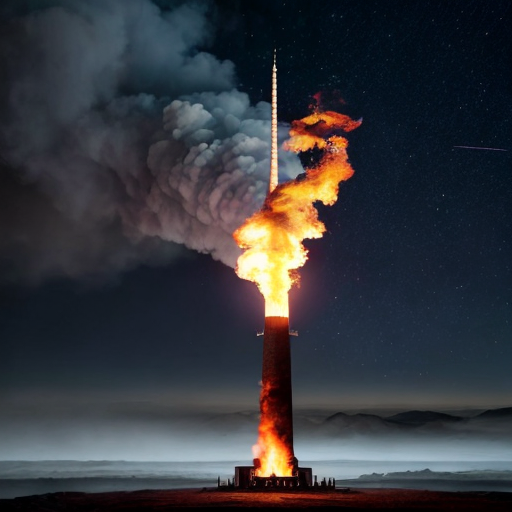The Impact of World War II on Fahrenheit 451
World War II had a significant impact on the development of Ray Bradbury's dystopian novel, Fahrenheit 451. The war brought about a heightened sense of fear and censorship, which is reflected in the novel's oppressive society where books are banned and burned. The trauma and destruction of World War II also influenced Bradbury's portrayal of a society consumed by technology and distracted from reality. The historical events of World War II served as a catalyst for Bradbury to explore themes of censorship, conformity, and the dangers of a society that suppresses knowledge and critical thinking.
The McCarthy Era and Censorship in Fahrenheit 451
An interesting fact about the historical events that influenced Fahrenheit 451 is that Ray Bradbury wrote the novel during the height of the McCarthy era in the United States. The McCarthy era was characterized by intense anti-communist sentiment and the fear of communist infiltration in American society. This atmosphere of censorship, paranoia, and the suppression of free speech greatly influenced Bradbury's dystopian vision of a future society in Fahrenheit 451, where books are banned and burned to maintain social control. The novel serves as a cautionary tale against the dangers of censorship and the importance of preserving intellectual freedom.
The McCarthy Era and its rampant censorship also played a crucial role in shaping Fahrenheit 451. Ray Bradbury was deeply influenced by the climate of fear and suspicion during this time, where individuals were persecuted for their beliefs and ideas. This atmosphere of censorship and suppression of dissenting voices is mirrored in the novel's portrayal of a society where free thought and expression are forbidden. The McCarthy Era highlighted the dangers of conformity and the power of government control over information, which Bradbury used as a cautionary tale in Fahrenheit 451.
The Rise of Television and Its Influence on Fahrenheit 451

The rise of television in the 1950s had a profound influence on Ray Bradbury's Fahrenheit 451. As television became a dominant form of entertainment and information, Bradbury observed how it could potentially shape society's values and behaviors. In the novel, the characters are consumed by mindless entertainment on their parlor walls, reflecting Bradbury's concerns about the impact of television on intellectual engagement and critical thinking. The constant distraction and instant gratification provided by television in the real world were mirrored in the novel's society, where individuals were discouraged from engaging with literature and deep reflection.
Bradbury's portrayal of the influence of television in Fahrenheit 451 also reflects the broader cultural shift towards visual media and away from written texts. As television became more accessible and popular, Bradbury saw how it could potentially diminish the importance of books and reading in people's lives. The novel's depiction of a society where books are banned and burned can be seen as a cautionary tale about the consequences of prioritizing visual entertainment over intellectual pursuits. Through Fahrenheit 451, Bradbury raises questions about the role of technology in shaping human behavior and the potential dangers of a society that values entertainment over knowledge.
Furthermore, the rise of television during the Cold War era also influenced Bradbury's exploration of government control and censorship in Fahrenheit 451. The novel's dystopian society, where the government monitors and censors all forms of media, reflects the climate of fear and surveillance that characterized the Cold War period. Bradbury's depiction of a society where dissenting voices are silenced and independent thought is suppressed can be seen as a response to the political paranoia and censorship of the time. By drawing parallels between the rise of television and the erosion of intellectual freedom, Bradbury highlights the potential dangers of unchecked government power and the importance of preserving individual autonomy and critical thinking skills.
In conclusion, the rise of television in the 1950s and its cultural impact on society played a significant role in shaping Ray Bradbury's Fahrenheit 451. Through his novel, Bradbury explores the consequences of a society consumed by mindless entertainment, the diminishing value of literature in the face of visual media, and the dangers of government control and censorship. By drawing on the historical events of his time, Bradbury creates a compelling narrative that serves as a warning about the potential consequences of sacrificing intellectual freedom and critical thinking in favor of passive entertainment.
The Cold War and the Fear of Nuclear Annihilation in Fahrenheit 451
A fun fact about the historical events that influenced Fahrenheit 451 is that Ray Bradbury, the author of the novel, was inspired by the rise of television and its impact on society. He witnessed the increasing popularity of television in the 1950s and believed that it was leading to a decline in reading and critical thinking. This concern led him to imagine a dystopian future where books are banned and burned, and people are entertained solely by mindless television programs. Thus, Fahrenheit 451 serves as a cautionary tale about the potential consequences of a society overly reliant on technology and passive entertainment.
The Cold War and the pervasive fear of nuclear annihilation during the 1950s also influenced Ray Bradbury's Fahrenheit 451. The looming threat of nuclear war and the constant tension between superpowers shaped the novel's dystopian setting, where society is on the brink of destruction. The characters' sense of unease and anxiety in the face of impending catastrophe mirrors the collective fear of nuclear annihilation that permeated the Cold War era. Bradbury's exploration of a world teetering on the edge of disaster serves as a reflection of the existential dread and uncertainty that defined the historical context in which Fahrenheit 451 was written.

